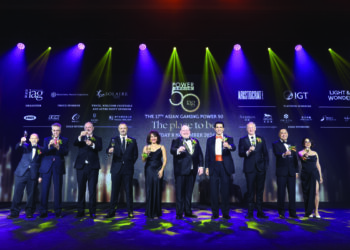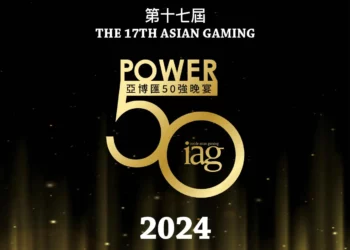The second annual ranking of the industry’s most influential people
If one pauses for a moment and tries to take a longer view, it becomes clear that it’s not the industry’s talent pool that has somehow drained away. It’s just the general level of confidence and the financial framework that has changed.
Things are still moving forward, however, in multiple Asian markets. The Philippines opened its biggest casino yet only a few weeks ago. Taiwan appears to be closer to legalising casinos than at any time in the past 20 years. Two new integrated gaming resorts complete with tournament-standard golf courses are expected to begin construction in Cambodia and Vietnam, respectively, within the next 12 months. Singapore is even closer to launching its two integrated resorts. It is people—talented and driven people—that make those things happen. All the money in the world won’t help without the human will to succeed.
In the biggest Asian gaming market, Macau, Melco Crown Entertainment has opened its City of Dreams resort, and L’Arc, licensed by Dr Stanley Ho’s casino company, SJM, is due to open this month. In the online sector, Internet use in Mainland China continues to grow rapidly, especially among the young, giving unparalleled opportunities, particularly for providers of so-called ‘soft’ gaming services such as role playing games. That online growth is reflected in some of the names on the Asian Gaming 50 – 2009.
Against this background, the recession looks more like a blip than an insurmountable hurdle. The trend is upward and onward, and the people listed here in the Asian Gaming 50 – 2009 are among the best of the best. Their goal may be to make the most money possible for themselves and their companies. But in doing so, they are helping to create and maintain a culture of excellence in terms of products and services that has the ability to make the Asian gaming industry not only the highest grossing in the world, but the very best.
We invite you to be part of the Asian Gaming 50 – 2009 debate by emailing your comments to the editor at michael@staging.asgam.com.
About the Sponsor
KaiRo International is one of the world’s leading specialists in casino startups in emerging markets. KaiRo International whilst primarily involved in the European and African gaming industries in both ownership and operations are currently expanding into Asia.
The KaiRo International team is made up of gaming executives who have had numerous years of experience in all aspects of the gaming industry, from stand-alone slot machine operations to full-fledged mega casino resorts. KaiRo International sees numerous opportunities in the Asian market for the small to mid ranged size of operations with both live game and slot machines.
KaiRo International is currently involved in projects in Vietnam and is investigating possible opportunities in neighboring countries.
John A. Robbins, Chairman of KaiRo International said: “We are very happy to be the sponsor of IAG‘s Asian Gaming 50 – 2009 list. The list has become a valuable at-a-glance guide to some of the key figures in the Asian part of the industry. It contains not only historical information about how the industry leaders rose to prominence, but also some insight into where they, their companies and the regional industry may be heading next.”
Core Ranking Methodology
By their very nature, lists such as Inside Asian Gaming‘s ranking of the 50 most influential people in Asian gaming are bound to incorporate elements of subjectivity, though we have applied a rigorous analytical methodology to arrive at the results. We enlisted a panel of eight independent gaming industry executives and analysts from around the region to compile the rankings, which will likely result in lively debate and even controversy.
Even measuring the objective criteria posed difficulties, because many of Asia’s biggest gaming companies remain in private hands, making it difficult—if not impossible—to obtain accurate financial records. Therefore, market share and other business KPIs were estimated after extensive discussions with peers, competitors, suppliers and customers.
Another consideration is that Asia’s gaming sector can often be particularly country-specific, so we endeavoured to select panellists from not only high profile casino jurisdictions such as Macau, but also emerging gaming markets around the region. We sought feedback from various gaming sectors including parimutuels and Japan’s massive pachinko industry—omitting pachinko just because the Japanese government does not technically consider it gambling would, in our view, be a misrepresentation. We also included online operators, who are making an ever greater impact in the region, regardless of the official status of their businesses.
Even though government agencies ultimately control and influence all regulated gaming in Asia, after much discussion we decided to exclude individuals such as Macau’s Chief Executive, gaming regulators in the various jurisdictions (including Macau’s Direcção de Inspecção e Coordenação de Jogos and Singapore’s Casino Regulatory Authority), and senior officers of the Culture, Welfare, Sports and Finance Ministries in China, who set out the framework that gaming takes place in. One exception to the exclusion of government officials was made for the Chairman of PAGCOR.
The eight panellists were instructed to nominate individuals for the Asian Gaming 50 – 2009. The initial list of 78 individuals was put through a scoring process to arrive at the final rankings. The panellists gave each of the nominated individuals a score of between 1 and 10 on the following criteria:
1. How well known is the individual within the gaming sector in Asia?
2. How successful has the individual been historically in the gaming sector?
3. How fast has their business grown over the last 5 years?
4. What is their potential for future growth in their current gaming sub-sector and other gaming sub-sectors in Asia?
5. How successful are they financially (individually and/or company, or individual together with company, where relevant)?
6. How influential are they with the government and regulators within their jurisdictions of operations?
7. How influential are they internationally within the gaming industry (individually and/or company, or individual together with company, where relevant)?
8. How much of an innovator are they within the gaming industry?
9. How well are their products and/or services marketed and promoted?
10. How much do they own of their principal business and/or how much control do they have over their company?
11. How well positioned are they to cope with competition within their existing jurisdictions of operation and from overseas competition?
12. How do you perceive their dominance in their current major markets of operation?
Feedback from the panellists led to each question being given a specific weighting—between 90% and 115%. Further weightings were applied relating to the company the nominated individual either works for or controls. These include the company’s status (public or private), financial performance and size (in terms of both operations and market capitalisation/value), as well as the size/importance of the markets it operates in. Finally, panellists applied a further weighting for each nominated individual with respect to his or her perceived personal integrity, effectiveness in management, overall track record and foresight.


























